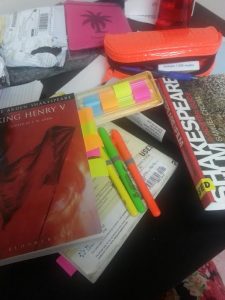I have never mastered the ability to take excellent notes while listening to lectures that many of my fellow classmates have. It is something I constantly struggle with. I feel this sense of anxiety trying to keep up with what is being said. So, a habit I have picked up while taking notes in class, is writing one word points that I can go over once class is finished, using both the professor’s slides and textbooks. This is also the method I use when reading through a specific text. I highlight key terms in the text that pop out at me while reading. I feel like only highlighting these key terms allows me to focus, as well as using these terms as triggers words that I can remember. Reading Shakespeare texts is a whole different ball game. First thing I did before reading King Henry V is looking up the acts and scenes on Sparksnotes. If this play has been adapted into film, which most have been, I like to also watch it before I read the play. After that I would read the actual scene in the book, highlighting those terms I do not know. At this point I would write notes down in a notebook summarizing scenes I have read. I would follow this with another look at Sparksnotes to help me fully comprehend what I have read because of the old English Shakespeare likes to use. I also love to use cue cards to help separate different topics, scenes, and terms.

Now watching a film for academic purposes or research is a different story. I like to watch it the first time taking no notes at all. I don’t want to be distracted by having to take notes because I might miss an important line or interaction. I will then watch the film for a second time around, making sure I take notes of important sequences, actors, settings, etc. As to watching a film that has been adapted from a play or novel I have varying opinions. I have noticed that going into a movie after reading the novel, really affects my watching pleasures. I am so busy dissecting every minute of the film. Why is this character played by a male, why was this whole chapter missing, or why was the order of events done differently? These are the types of questions going through my mind as I watch the movie. I have this rule now, where I will not watch a film if I have already read the book or vise versa. There is just too much disappointment, so I do one or the other, never both.
Before I go on a tangent of all the movies I have ever watched, let me get back to my point. If I am being honest I never thought about the freedom Directors and Screenplay writers have when adapting a novel/play into film. I always thought there were copyrights that would prevent someone from changing it too much. It was only after taking this course and reading Crowl’s Shakespeare and Film: A Norton Guide that I realized this. So this is something that I will have to take in to consideration when watching adaptations.
When make annotation, whether it’s from reading a text, listening to a lecture, or watching a film, my first inclination is to just listen and absorb what is being said. Taking down quick jot notes of key terms is crucial. Side note; I love to use bright colours when taking notes because it makes me happy. It is important to remember not to get stuck on one thing because you might miss something else. I also, like having discussions about what was taught in class that day with a fellow student. Putting into words what I understood from the lecture/reading/ film, and hearing how someone else might have interpreted it, helps a great deal.
Leave a Reply
You must be logged in to post a comment.